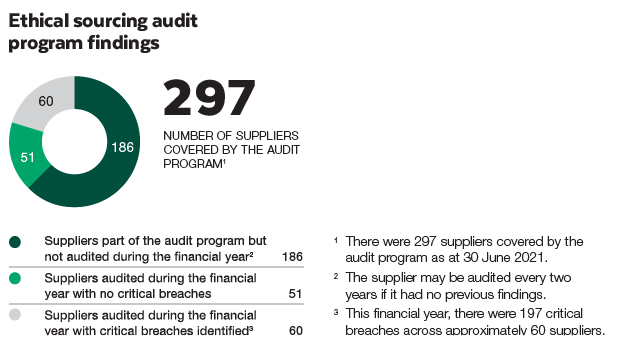Bunnings - Responsible sourcing
 As a leading retailer of home improvement and outdoor living products, Bunnings’ global merchandise supply chains are complex.
As a leading retailer of home improvement and outdoor living products, Bunnings’ global merchandise supply chains are complex.
Bunnings is a major retailer of timber and products containing wood and recognises its role in supporting sustainable forestry practices through its responsible sourcing program. The team also recognises their role in upholding human rights with Bunnings’ robust ethical sourcing program continuing to evolve in line with industry developments. This program includes relevant provisions in supplier trading terms, sourcing policies, training, education and Bunnings’ Ethical Sourcing Code of Conduct.
Bunnings’ responsible sourcing program focuses on identifying and mitigating potential social and environmental risks associated with sourcing timber. Bunnings’ goal is to ensure all timber and wood products originate from legal and well managed forestry operations.
To reduce the risks associated with uncertified natural forest timber procurement, in August 2018 Bunnings revised its Responsible Timber Sourcing Policy (Policy). The revision requires all natural forest timber products to be independently certified to Forest Stewardship Council® (FSC), Programme for the Endorsement of Forest Certification (PEFC) or other equivalent standard by the end of 2020, with FSC preferred in highly contentious regions.
In December 2020, Bunnings released an addendum to its Policy to acknowledge and reflect the legitimate challenges encountered by incumbent suppliers that had been adversely affected by COVID-19. This addendum granted an extension to seven affected suppliers beyond the December 2020 Policy certification deadline. Bunnings continues to work closely with these suppliers to monitor their progress to complete certification of existing natural forests or transition to a low-risk plantation source.
During the year, Bunnings also reviewed and updated its due diligence process to monitor timber supplier performance in accordance with its Policy and increased the frequency of timber supplier surveys to facilitate more accurate and regular monitoring. Bunnings’ responsible timber sourcing survey is required to be completed by suppliers of timber, wood or fibre products to Bunnings, and captures the timber species, country of harvest, forest type, country of manufacture, applicable timber certification, and product claims for timber products including component and composite products which have a percentage of timber inputs.
Bunnings recognises responsible sourcing practices apply to other commodities and raw materials and further exploration of risks associated with other key commodities will be undertaken in the coming financial year.
Bunnings’ robust ethical sourcing and modern slavery framework continued to underpin its operations. In the financial year, 138 manufacturing sites remediated more than 1,370 non-conformances identified via third-party audits, which improved working conditions for more than 50,000 workers in 15 countries.
Bunnings’ grievance mechanism program, Speak Up, continued during the year, with 119 factories throughout China participating in the program. In response to worker feedback, Bunnings delivered an online training module during the year, providing practical advice and guidance to factory management teams about how to effectively manage production needs and working hours. During the year, Bunnings also expanded the scope of its Speak Up Program by making it available to in-store service providers such as cleaners and security guards across Australia and New Zealand.
Training Bunnings’ team and suppliers was a major focus throughout the year, with over 1,300 Bunnings team members and more than 320 suppliers and manufacturers completing online modern slavery and human rights training. Bunnings also engaged ethical trade consultancy, Impactt, to refine Bunnings’ approach to identifying and responding to forced labour.
In March 2021, Bunnings signed an open letter to the New Zealand Government in support of introducing modern slavery legislation. In the coming year, Bunnings will continue to expand its ethical sourcing program towards its long-term objective of achieving appropriate human rights due diligence covering all goods for resale, goods not for resale and services.